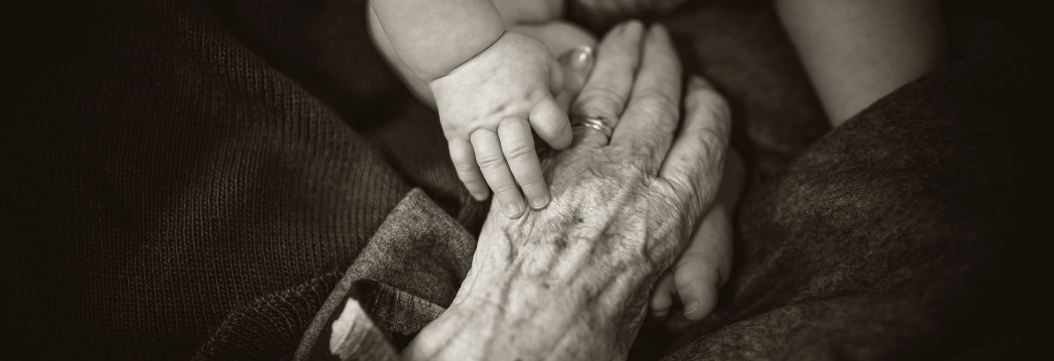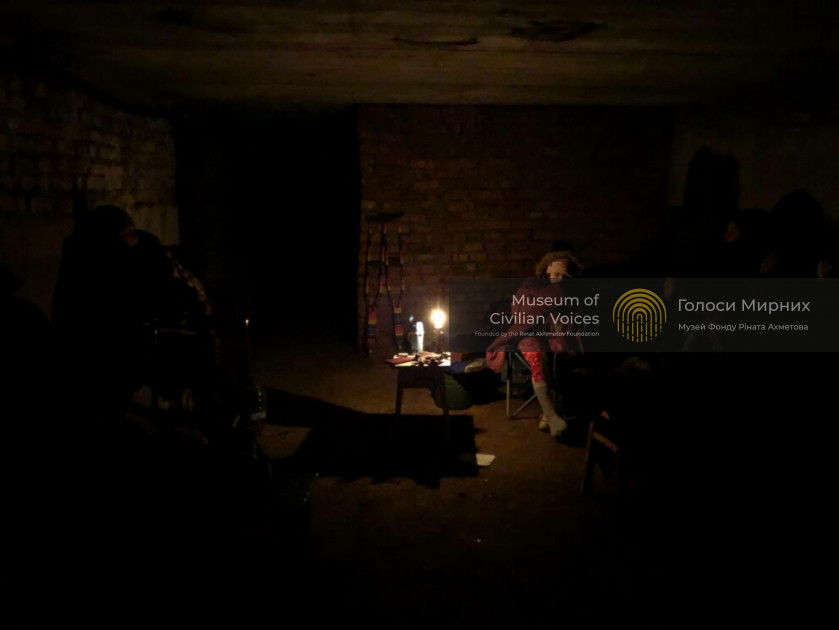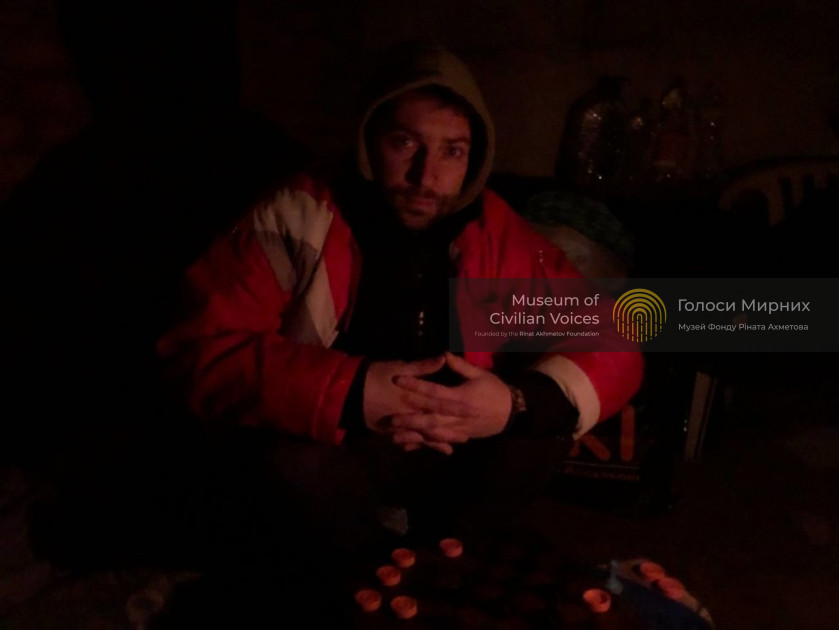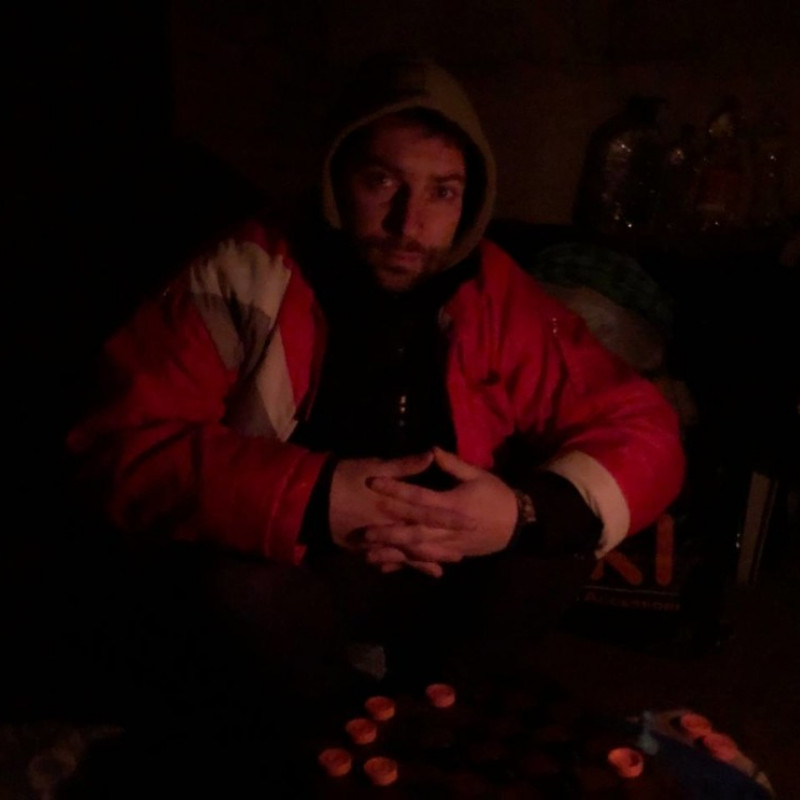
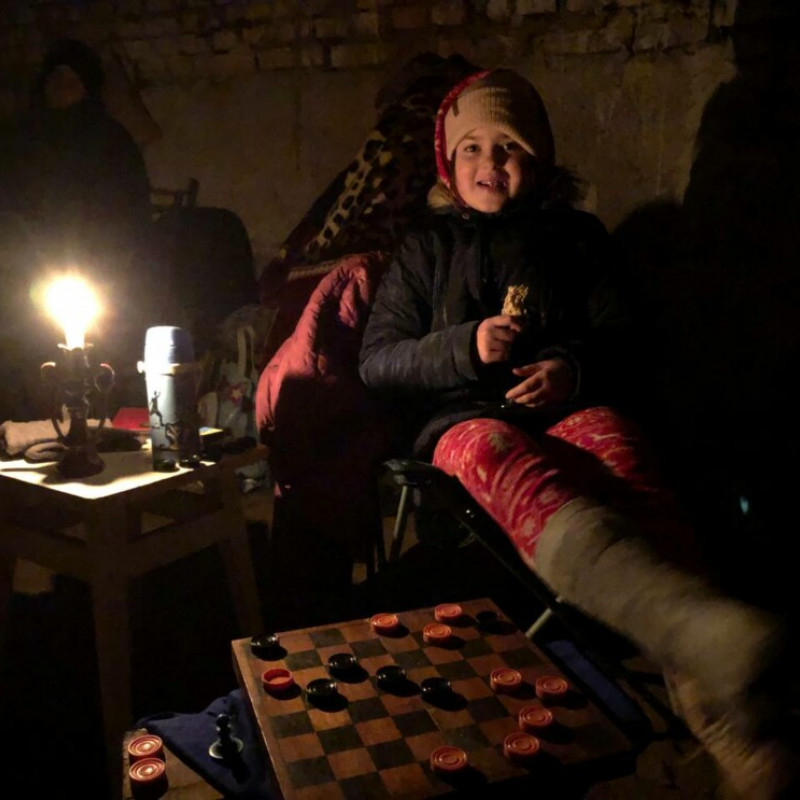
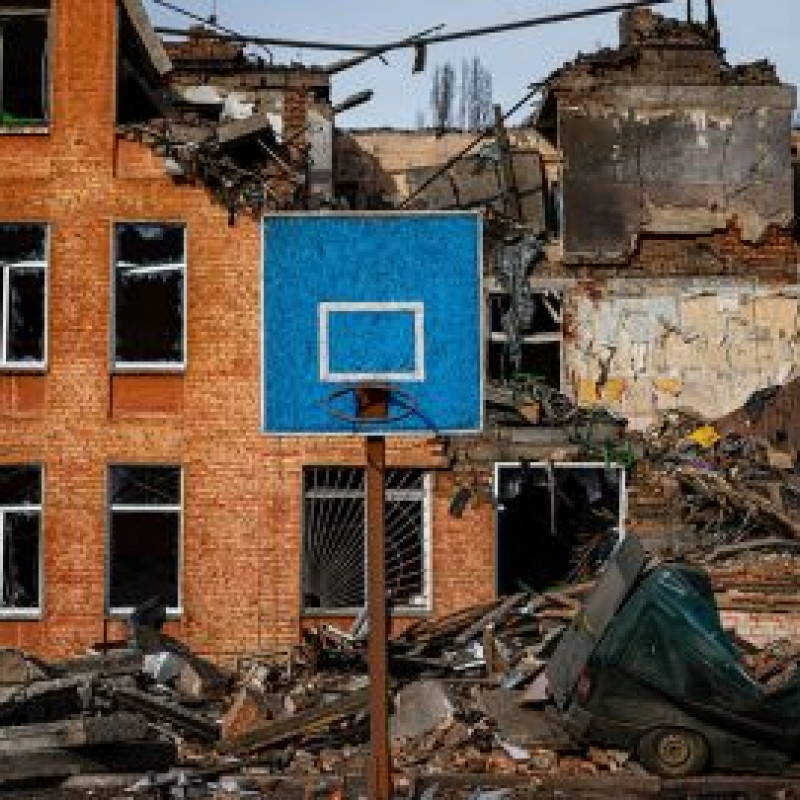
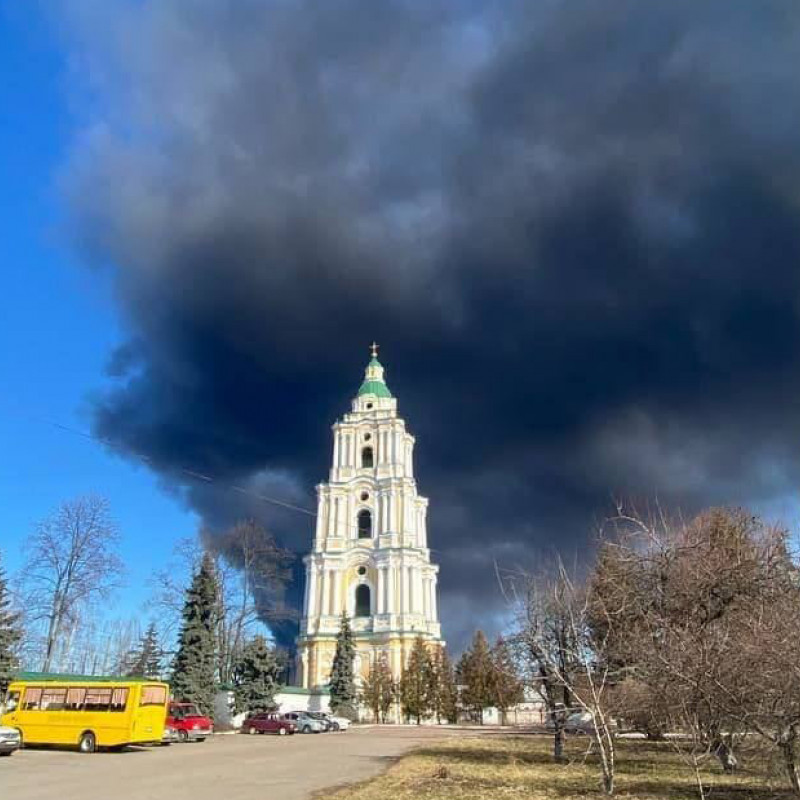
Ukrainian photographer Serhiy Ristenko and his family spent 21 days in the occupied village of Novyi Bykov in Nizhynskyi district of Chernihiv region. Serhiy recounted those three weeks that had changed the life of his family forever.
“When we escaped, I could not believe that the plate of food I received was just my one-time portion.”
In the evening on the eve of the war, I opened the news reports and filtered out three points from the whole feed:
- the Russians stopped letting people out from the Crimea to the territory of Ukraine
- information about a convoy moving through Donetsk appeared
- another media outlet said that the war would begin within 24 hours.
That worked as a trigger.
“I put together the facts and realized that the war was very close. But, of course, if something breaks out, it will not be all over Ukraine.”
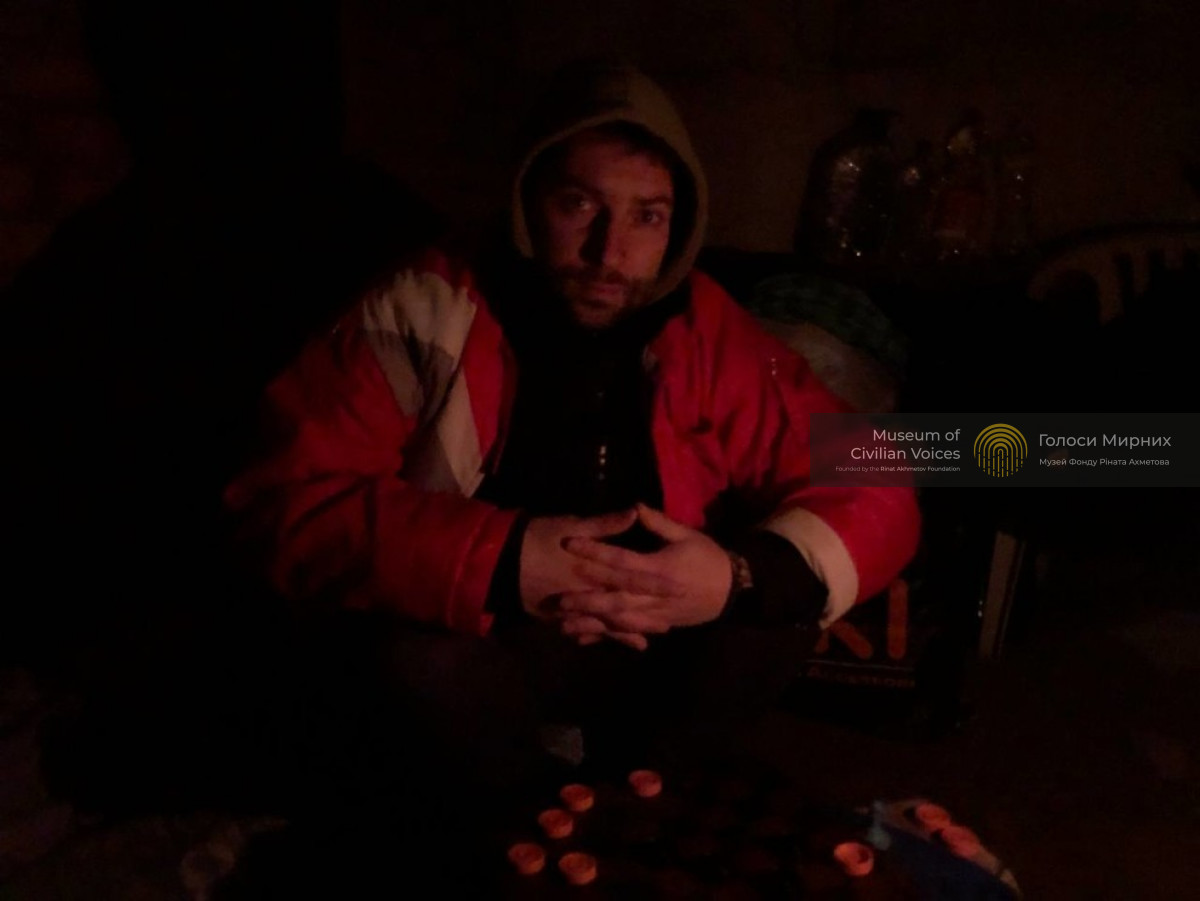
I woke up at five in the morning on 24 February and realized that the situation was “deep sh*t”, the war was everywhere. We got packed in 15 minutes and went to the village, our whole family. One of the main reasons for the trip was that my daughter Eleonora had stretched her ligaments shortly before and now she could not move without crutches, so it would be very difficult for her to run down to the bomb shelter.
The first days in the village were quiet, but there were some rumours about a mysterious tank column that was roaming somewhere from the side of Nizhyn. On one occasion, it appeared, but then on the other, it disappeared.
“At first, everyone got alarmed, but later people even started joking about it. Jokes are a nice thing, but it turned out to be true.”
A post appeared in the village’s group on social networks, “In order not to let the enemy pass, the bridge must be blown up!” To make it clear, this is a small bridge between two villages. Blowing it up is like taking a manhole hatch out and thinking that the tank will not pass here. We laughed at the fact that such a delusion could come to somebody’s mind.
The bridge was blown up on 27 February. At the same time, the village was disconnected from electricity and gas. And in 40 minutes, a huge tank column entered the place. As was said, about 800 units of military vehicles.
First of all, they began a chaotic shooting in the village. Everyone rushed to the bomb shelters or basements. News later reported that six men had been shot.
"Their dead bodies had been laying in the field all week long till people were allowed to bury them."
As I understand it, the tanks were moving to Brovary and decided to occupy our village. At that moment, the village’s local authorities disappeared and anarchy began, where the main argument was a machine gun.
When tanks and machine guns fire 10 meters from the basement where you are hiding, you realize that it is over, you will not be able to escape. Any movement detected – and immediately fire for effect could be opened. A man was driving his car and wanted to slip through. The car was riddled with bullets and turned into a sieve. Another man went out into the yard to have a look around and a burst of machine-gun fire was aimed at him.
As a child, I read many books about World War II and now I realized that I had become a book character and found myself in the occupation.
“What previously seemed absurd and incomprehensible, suddenly became a reality. And your main task is just to survive.”
At all exits and entrances, checkpoints were set up immediately. They also began to mine roadsides and fields.
We were trapped.
At first, people were just afraid to go outside, but then they began to move within their streets, no further. Automatic assault rifle fire and machine-gun shooting were constantly heard in the village. Shops and pharmacies were ransacked by looters at the very beginning. In a week’s time, our first contact happened when soldiers came to ask for cigarettes and water.
Then, for the first time, the rules of life under the occupation were announced, “If you want to move through the streets, you should wear white armbands”.
"If we see some men outside, we will open fire. If you want to ask something, only women. I interpreted this as they were very afraid of us.”
There were attempts at some “noble” steps, “Do not be afraid of us, we have come to liberate you.” For sure, if it were not for their machine guns, every second person would send them to the same place where the Russian warship was sent in gratitude for such a “liberation”.
In one of the hamlets, they simply forced people out of their houses, or people fled themselves in fear. They parked their APCs and tanks in villagers’ backyards and asked, “Why have you left? Do not be afraid of us, live on here.”
But how can you live when you have a tank parked in your yard, and about 15 Buryat soldiers with machine guns, who start firing in bursts once they notice any rustling?
There were also some snitches in the village who just started ratting out all the locals. Territorial defence unit – our “ray of goodness” from the local authorities – fled and left a paper with a list of 10-12 people who had been given weapons on the table of their office. Clearly, everyone was immediately found and taken prisoner.
“Locals began to quote one sadly remembered saying: “Other people’s lice are not as bad as your own nits.”
I prayed that everyone would forget that I had a drone. The whole village knew about it. Thank you, God, that it worked itself out. There were examples when women just kicked them [the soldiers] out with a broom...
The most difficult point for me was the children. I have two kids. Eleonora, who is 11, and Leonard, who is 5 years old. The first two days, when we were staying in the bomb shelter (basement), we made up some interesting stories for the children about what was happening outside. And while the younger one took it as a game, our older kid, certainly, felt stressed and cried.
Then, staying in the basement for almost two days, the children fell ill. And I fell ill after them.
“We need to give a due credit to our neighbours. The whole street was immediately informed that our children were ill. Everyone brought us what they had at home.”
It was especially touching when an elderly woman came with a cough syrup and refused to take any money for it. When the residents of our street ran out of medicines, they began to bring some folk remedies. I tried to keep up the mood and make some jokes. I taught my daughter to play cards. I knew that I had to be an example of composure and calmness for the kids.
When a Russian BUK (anti-aircraft missile complex) started firing missiles right near us, and then our artillery started targeting them, we were double-hit. Eleonora went to bed in her clothes, with her shoes on and with a backpack behind her back. It was simply impossible to persuade the child to undress before going to sleep.
“When electricity, water and telephone signal disappeared, I explained to the children that it was like a tourist trip to the enemy’s rear, where our task was to live and keep out of their sight.”
We had some snow and frost. We put buckets under the rainwater pipes, collected some water and then filtered it. It was our technical water. We had a small supply of drinking water and used it very carefully. I learned how to wash my face, wash my hands and brush my teeth using just one glass of water.
Most people’s homes are heated with gas, while we are sort of village old-timers. That is why we always heated our house with firewood. Our neighbours came to us to cook some food.
“There were some terrible stories when an elderly couple died from the cold in their house without heating.”
We had a supply of food that we used quite sparingly, giving the best to the children. Under such conditions, a usual portion of food was divided into three. People started practicing an in-kind exchange (food barter). For example, we baked some bread in the oven and exchanged it for milk, eggs, cheese, and so on. All the time, we exchanged between the yards, through the fences, so as not to walk in the street.
At some point, people who were forced from their homes began to come to our area, so our food began to run out much faster. I felt like I lost about seven kilograms.
"When we escaped, I could not believe that the plate of food I received was just my one-time portion."
Of course, we hoped that we would be paid heed to, that we would be noticed. I assembled a radio from the children’s DIY set, and we listened to the news. The main message we heard was “we care about you”.
Three weeks later, rumours surfaced that some people were let out to the neighbouring village on foot through checkpoints to pick up some food, but they were searched and everything was taken away. I realized that it was simply impossible to walk with my whole family. I trusted my own intuition, which prompted me to sit still.
I hoped we would be saved and waited for a better time to escape.
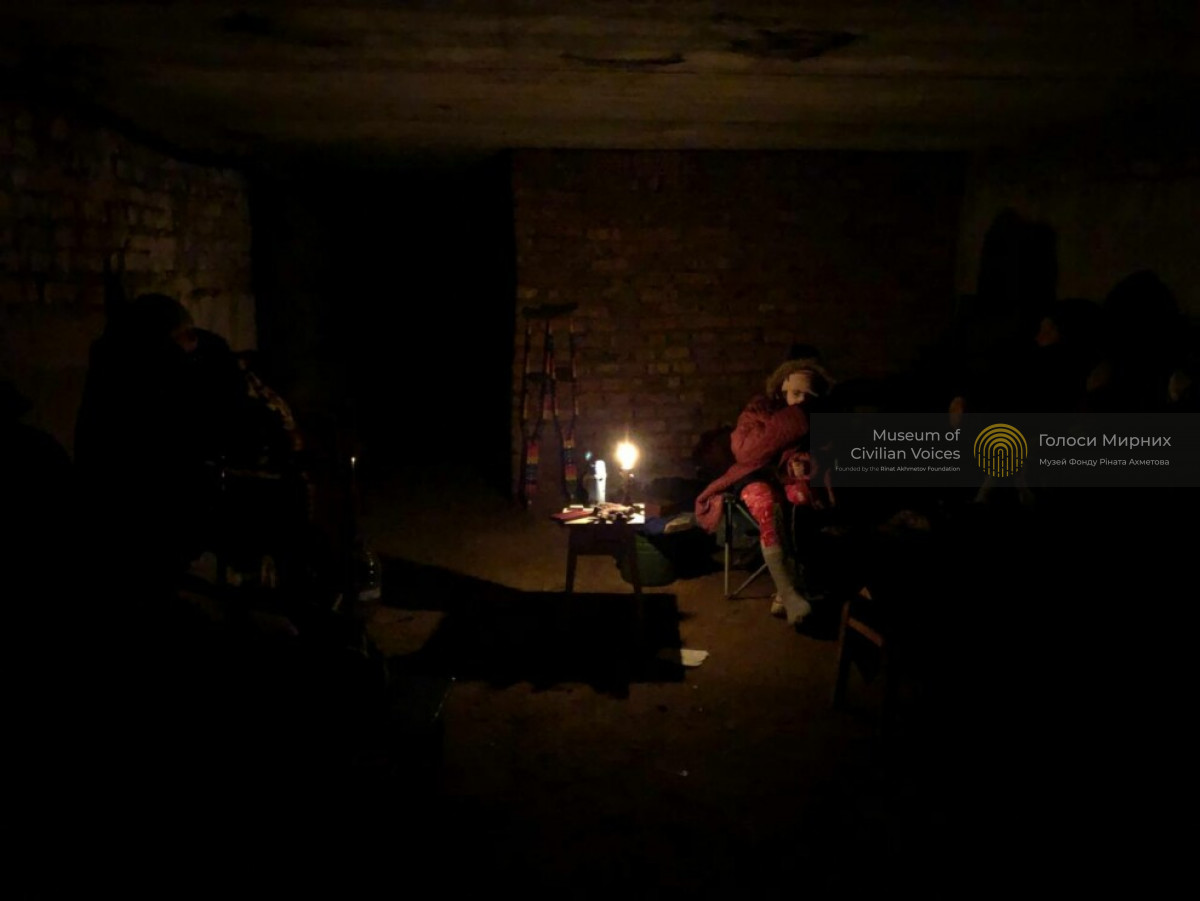
“Three days before we left, there were some rumours that people were let out on their cars. But again, there were stories about cars being taken away. Before that, all the cars had been just shot at.”
Saturday, six in the morning, a knocking on the window. Our neighbour Tanya says, “And now it is time to go!”
We got ready in 10 minutes. We packed everything, while analysing the possibility of our operation’s success and the possibility of saving our lives. When our neighbours and we got in the cars and left, I realized that there was no going back.
"My favourite thought these days is that it is such a beautiful day that we simply cannot die.”
All the last days were sunny and warm. We went through four Russian checkpoints, and this was a separate story. Nobody helped us. The only “green corridor” we had was a corridor of Russian soldiers wearing green uniforms.
My work is connected with constant negotiations and agreements. I can definitely say that this was the hardest and most dangerous project of my life.
On our way, we stopped at the service station. A guy from the car washing shop came up to me with a cup of coffee and greeted me cheerfully.
"He was the first person I spoke to in the unoccupied territory. I looked at this relaxed man and remembered that some 15 kilometres from this place you live just in hell, but here everything was different.”
The same sun, the same trees, but you enter a shop and there is electricity, and people even wear [COVID] facemasks. During the first few days in the unoccupied territory, the children shuddered at any noise, even minor one. We tried to make some peaceful-life routines. For example, we went to a pizzeria in Cherkasy.
It is very painful when my five-year-old son starts his phrase with “Before the war we...” Or when some kids play ball on the playground next door and my son says,
“Mum, why are they running. Don’t they have a war?" I really hope that the children will get away with it."
When under the occupation, I always dreamed of a peaceful life – a real movie. On the first night of freedom, I could not sleep at all. Any, even some ordinary life situations, made my eyes well up with tears. I understand that after all the experience, it is very difficult to be the same as you used to be, and it is impossible to forget it.
Those 21 days changed my family’s life forever. I kept a diary. I looked into it yesterday and started to cry. I am not going to look into it yet.
Maybe some time will pass and I will publish it.
When quoting a story, a reference to the source – the Museum of Civilian Voices of the Rinat Akhmetov Foundation – is mandatory, as follows:
The Museum of Civilian Voices of the Rinat Akhmetov Foundation https://civilvoicesmuseum.org/
